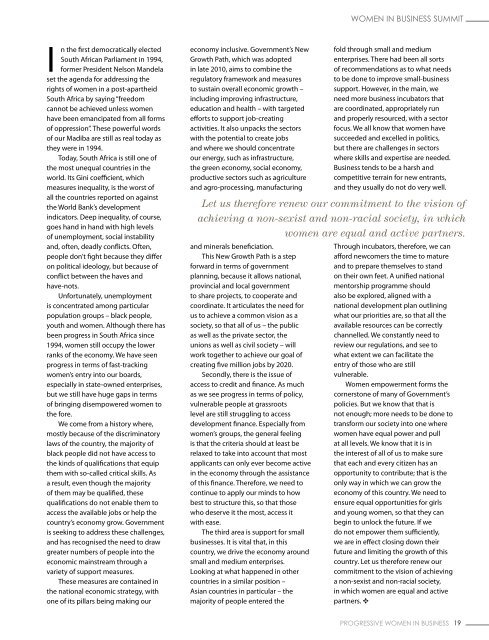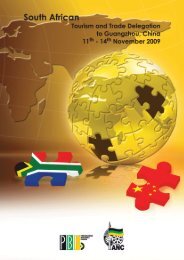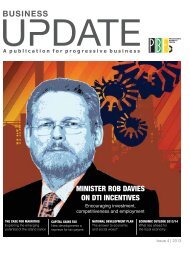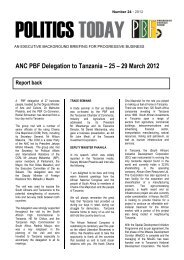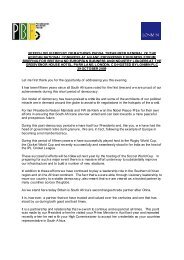SAFARI - the Progressive Business Forum website
SAFARI - the Progressive Business Forum website
SAFARI - the Progressive Business Forum website
- No tags were found...
Create successful ePaper yourself
Turn your PDF publications into a flip-book with our unique Google optimized e-Paper software.
WOMEN IN BUSINESS SUMMITIn <strong>the</strong> first democratically electedSouth African Parliament in 1994,former President Nelson Mandelaset <strong>the</strong> agenda for addressing <strong>the</strong>rights of women in a post-apar<strong>the</strong>idSouth Africa by saying “freedomcannot be achieved unless womenhave been emancipated from all formsof oppression”. These powerful wordsof our Madiba are still as real today as<strong>the</strong>y were in 1994.Today, South Africa is still one of<strong>the</strong> most unequal countries in <strong>the</strong>world. Its Gini coefficient, whichmeasures inequality, is <strong>the</strong> worst ofall <strong>the</strong> countries reported on against<strong>the</strong> World Bank’s developmentindicators. Deep inequality, of course,goes hand in hand with high levelsof unemployment, social instabilityand, often, deadly conflicts. Often,people don’t fight because <strong>the</strong>y differon political ideology, but because ofconflict between <strong>the</strong> haves andhave-nots.Unfortunately, unemploymentis concentrated among particularpopulation groups – black people,youth and women. Although <strong>the</strong>re hasbeen progress in South Africa since1994, women still occupy <strong>the</strong> lowerranks of <strong>the</strong> economy. We have seenprogress in terms of fast-trackingwomen’s entry into our boards,especially in state-owned enterprises,but we still have huge gaps in termsof bringing disempowered women to<strong>the</strong> fore.We come from a history where,mostly because of <strong>the</strong> discriminatorylaws of <strong>the</strong> country, <strong>the</strong> majority ofblack people did not have access to<strong>the</strong> kinds of qualifications that equip<strong>the</strong>m with so-called critical skills. Asa result, even though <strong>the</strong> majorityof <strong>the</strong>m may be qualified, <strong>the</strong>sequalifications do not enable <strong>the</strong>m toaccess <strong>the</strong> available jobs or help <strong>the</strong>country’s economy grow. Governmentis seeking to address <strong>the</strong>se challenges,and has recognised <strong>the</strong> need to drawgreater numbers of people into <strong>the</strong>economic mainstream through avariety of support measures.These measures are contained in<strong>the</strong> national economic strategy, withone of its pillars being making oureconomy inclusive. Government’s NewGrowth Path, which was adoptedin late 2010, aims to combine <strong>the</strong>regulatory framework and measuresto sustain overall economic growth –including improving infrastructure,education and health – with targetedefforts to support job-creatingactivities. It also unpacks <strong>the</strong> sectorswith <strong>the</strong> potential to create jobsand where we should concentrateour energy, such as infrastructure,<strong>the</strong> green economy, social economy,productive sectors such as agricultureand agro-processing, manufacturingand minerals beneficiation.This New Growth Path is a stepforward in terms of governmentplanning, because it allows national,provincial and local governmentto share projects, to cooperate andcoordinate. It articulates <strong>the</strong> need forus to achieve a common vision as asociety, so that all of us – <strong>the</strong> publicas well as <strong>the</strong> private sector, <strong>the</strong>unions as well as civil society – willwork toge<strong>the</strong>r to achieve our goal ofcreating five million jobs by 2020.Secondly, <strong>the</strong>re is <strong>the</strong> issue ofaccess to credit and finance. As muchas we see progress in terms of policy,vulnerable people at grassrootslevel are still struggling to accessdevelopment finance. Especially fromwomen’s groups, <strong>the</strong> general feelingis that <strong>the</strong> criteria should at least berelaxed to take into account that mostapplicants can only ever become activein <strong>the</strong> economy through <strong>the</strong> assistanceof this finance. Therefore, we need tocontinue to apply our minds to howbest to structure this, so that thosewho deserve it <strong>the</strong> most, access itwith ease.The third area is support for smallbusinesses. It is vital that, in thiscountry, we drive <strong>the</strong> economy aroundsmall and medium enterprises.Looking at what happened in o<strong>the</strong>rcountries in a similar position –Asian countries in particular – <strong>the</strong>majority of people entered <strong>the</strong>fold through small and mediumenterprises. There had been all sortsof recommendations as to what needsto be done to improve small-businesssupport. However, in <strong>the</strong> main, weneed more business incubators thatare coordinated, appropriately runand properly resourced, with a sectorfocus. We all know that women havesucceeded and excelled in politics,but <strong>the</strong>re are challenges in sectorswhere skills and expertise are needed.<strong>Business</strong> tends to be a harsh andcompetitive terrain for new entrants,and <strong>the</strong>y usually do not do very well.Let us <strong>the</strong>refore renew our commitment to <strong>the</strong> vision ofachieving a non-sexist and non-racial society, in whichwomen are equal and active partners.Through incubators, <strong>the</strong>refore, we canafford newcomers <strong>the</strong> time to matureand to prepare <strong>the</strong>mselves to standon <strong>the</strong>ir own feet. A unified nationalmentorship programme shouldalso be explored, aligned with anational development plan outliningwhat our priorities are, so that all <strong>the</strong>available resources can be correctlychannelled. We constantly need toreview our regulations, and see towhat extent we can facilitate <strong>the</strong>entry of those who are stillvulnerable.Women empowerment forms <strong>the</strong>cornerstone of many of Government’spolicies. But we know that that isnot enough; more needs to be done totransform our society into one wherewomen have equal power and pullat all levels. We know that it is in<strong>the</strong> interest of all of us to make surethat each and every citizen has anopportunity to contribute; that is <strong>the</strong>only way in which we can grow <strong>the</strong>economy of this country. We need toensure equal opportunities for girlsand young women, so that <strong>the</strong>y canbegin to unlock <strong>the</strong> future. If wedo not empower <strong>the</strong>m sufficiently,we are in effect closing down <strong>the</strong>irfuture and limiting <strong>the</strong> growth of thiscountry. Let us <strong>the</strong>refore renew ourcommitment to <strong>the</strong> vision of achievinga non-sexist and non-racial society,in which women are equal and activepartners. ✥<strong>Progressive</strong> women in business 19


